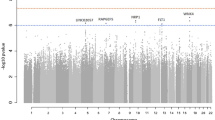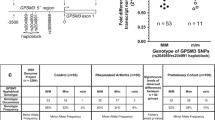Abstract
Transforming growth factor β1 (TGF-β1) levels influence many cellular, immunologic and pathologic processes. Activator protein 1 (AP1) and hypoxia are key regulators of TGF-β1 expression levels. The common TGFB1 promoter SNP c.−1347C > T (−509C-T, rs1800469) has been linked to a nearly twofold difference in plasma levels among individuals and with risk, progression, and outcome of numerous diseases. We demonstrate exclusive in vitro and in vivo recruitment of AP1 containing JunD to −1347C. This study also is the first to demonstrate hypoxia inducible factor 1 (HIF-1) binding to the TGFB1 promoter. HIF-1 was found to associate with both −1347C and −1347T and compete with AP1 for binding to −1347C. Reporter constructs demonstrate that expression differences between −1347C and −1347T are due to selective AP1 recruitment to the TGFB1 promoter. As AP1 is known to down-regulate transcription of other genes, we suggest that the molecular mechanism for the difference in TGF-β1 plasma levels linked to −1347 is due to transcriptional suppression by AP1 binding to −1347C. These data should aid in our understanding of the association of the −1347 SNP with the pathogenesis of certain TGF-β1-related diseases.





Similar content being viewed by others
Abbreviations
- SNP:
-
Single nucleotide polymorphism
- IHWS:
-
International Histocompatibility Workshop
- YY1:
-
Yin-yang 1
References
Awad MR, El Gamel A, Hasleton P, Turner DM, Sinnott PJ, Hutchinson IV (1998) Genotypic variation in the transforming growth factor-(beta)1 gene: association with transforming growth factor-(beta)1 production, fibrotic lung disease, and graft fibrosis after lung transplantation. Transplantation 66:1014–1020
Blobe GC, Schiemann WP, Lodish HF (2000) Role of transforming growth factor beta in human disease. N Engl J Med 342:1350–1358
Dery MA, Michaud MD, Richard DE (2005) Hypoxia-inducible factor 1: regulation by hypoxic and non-hypoxic activators. Int J Biochem Cell Biol 37:535–540
Drumm ML, Konstan MW, Schluchter MD, Handler A, Pace R, Zou F, Zariwala M, Fargo D, Xu A, Dunn JM, Darrah RJ, Dorfman R, Sandford AJ, Corey M, Zielenski J, Durie P, Goddard K, Yankaskas JR, Wright FA, Knowles MR (2005) Genetic modifiers of lung disease in cystic fibrosis. N Engl J Med 353:1443–1453
Dunning AM, Ellis PD, McBride S, Kirschenlohr HL, Healey CS, Kemp PR, Luben RN, Chang-Claude J, Mannermaa A, Kataja V, Pharoah PD, Easton DF, Ponder BA, Metcalfe JC (2003) A transforming growth factor beta1 signal peptide variant increases secretion in vitro and is associated with increased incidence of invasive breast cancer. Cancer Res 63:2610–2615
Grainger DJ, Heathcote K, Chiano M, Snieder H, Kemp PR, Metcalfe JC, Carter ND, Spector TD (1999) Genetic control of the circulating concentration of transforming growth factor type beta1. Hum Mol Genet 8:93–97
Haukim N, Bidwell JL, Smith AJ, Keen LJ, Gallagher G, Kimberly R, Huizinga T, McDermott MF, Oksenberg J, McNicholl J, Pociot F, Hardt C, D’Alfonso S (2002) Cytokine gene polymorphism in human disease: on-line databases, supplement 2. Genes Immun 3:313–330
Jessen BA, Qin Q, Rice RH (2000) Functional AP1 and CRE response elements in the human keratinocyte transglutaminase promoter mediating Whn suppression. Gene 254:77–85
Kim SJ, Angel P, Lafyatis R, Hattori K, Kim KY, Sporn MB, Karin M, Roberts AB (1990) Autoinduction of transforming growth factor beta 1 is mediated by the AP-1 complex. Mol Cell Biol 10:1492–1497
Kim SJ, Denhez F, Kim KY, Holt JT, Sporn MB, Roberts AB (1989a) Activation of the second promoter of the transforming growth factor-beta 1 gene by transforming growth factor-beta 1 and phorbol ester occurs through the same target sequences. J Biol Chem 264:19373–19378
Kim SJ, Glick A, Sporn MB, Roberts AB (1989b) Characterization of the promoter region of the human transforming growth factor-(beta)1 gene. J Biol Chem 264:402–408
Kim SJ, Glick A, Sporn MB, Roberts AB (1989c) Characterization of the promoter region of the human transforming growth factor-(beta)1 gene. J Biol Chem 264:402–408
Kim YJ, Lee HS, Im JP, Min BH, Kim HD, Jeong JB, Yoon JH, Kim CY, Kim MS, Kim JY, Jung JH, Kim LH, Park BL, Shin HD (2003) Association of transforming growth factor-beta1 gene polymorphisms with a hepatocellular carcinoma risk in patients with chronic hepatitis B virus infection. Exp Mol Med 35:196–202
Kim SY, Han SW, Kim GW, Lee JM, Kang YM (2004) TGF-beta1 polymorphism determines the progression of joint damage in rheumatoid arthritis. Scand J Rheumatol 33:389–394
Letterio JJ, Roberts AB (1998) Regulation of immune responses by TGF-beta. Annu Rev Immunol 16:137–161
Luedecking EK, DeKosky ST, Mehdi H, Ganguli M, Kamboh MI (2000) Analysis of genetic polymorphisms in the transforming growth factor-beta1 gene and the risk of Alzheimer’s disease. Hum Genet 106:565–569
Nishi H, Nakada T, Hokamura M, Osakabe Y, Itokazu O, Huang LE, Isaka K (2004) Hypoxia-inducible factor-1 transactivates transforming growth factor-beta3 in trophoblast. Endocrinology 145:4113–4118
Posch PE, Cruz I, Bradshaw D, Medhekar BA (2003) Novel polymorphisms and the definition of promoter ‘alleles’ of the tumor necrosis factor and lymphotoxin alpha loci: inclusion in HLA haplotypes. Genes Immun 4:547–558
Pulleyn LJ, Newton R, Adcock IM, Barnes PJ (2001) TGFbeta1 allele association with asthma severity. Hum Genet 109:623–627
Quarmby S, Fakhoury H, Levine E, Barber J, Wylie J, Hajeer AH, West C, Stewart A, Magee B, Kumar S (2003) Association of transforming growth factor beta-1 single nucleotide polymorphisms with radiation-induced damage to normal tissues in breast cancer patients. Int J Radiat Biol 79:137–143
Saha A, Gupta V, Bairwa NK, Malhotra D, Bamezai R (2004) Transforming growth factor-beta1 genotype in sporadic breast cancer patients from India: status of enhancer, promoter, 5′-untranslated-region and exon-1 polymorphisms. Eur J Immunogenet 31:37–42
Shah R, Rahaman B, Hurley CK, Posch PE (2006) Allelic diversity in the TGFB1 regulatory region: characterization of novel functional single nucleotide polymorphisms. Hum Genet 119:61–74
Sheares KK, Jeffery TK, Long L, Yang X, Morrell NW (2004) Differential effects of TGF-beta1 and BMP-4 on the hypoxic induction of cyclooxygenase-2 in human pulmonary artery smooth muscle cells. Am J Physiol Lung Cell Mol Physiol 287:L919–L927
Silverman ES, Palmer LJ, Subramaniam V, Hallock A, Mathew S, Vallone J, Faffe DS, Shikanai T, Raby BA, Weiss ST, Shore SA (2004) Transforming growth factor-beta(1) promoter polymorphism C-509T is associated with asthma. Am J Respir Crit Care Med 169:214–219
Smart DE, Vincent KJ, Arthur MJ, Eickelberg O, Castellazzi M, Mann J, Mann DA (2001) JunD regulates transcription of the tissue inhibitor of metalloproteinases-1 and interleukin-6 genes in activated hepatic stellate cells. J Biol Chem 276:24414–24421
de Souza AP, Trevilatto PC, Scarel-Caminaga RM, de Brito RB, Line SR (2003) Analysis of the TGF-beta1 promoter polymorphism (C-509T) in patients with chronic periodontitis. J Clin Periodontol 30:519–523
Weigert C, Sauer U, Brodbeck K, Pfeiffer A, Haring HU, Schleicher ED (2000) AP-1 proteins mediate hyperglycemia-induced activation of the human TGF-beta1 promoter in mesangial cells. J Am Soc Nephrol 11:2007–2016
Weitzman JB, Fiette L, Matsuo K, Yaniv M (2000) JunD protects cells from p53-dependent senescence and apoptosis. Mol Cell 6:1109–1119
Zhang H, Akman HO, Smith EL, Zhao J, Murphy-Ullrich JE, Batuman OA (2003) Cellular response to hypoxia involves signaling via Smad proteins. Blood 101:2253–2260
Acknowledgement
We would like to thank Dr. Nathalie Gualt for the generous gift of the TGFB1 promoter PGL3 construct. Funding from the Office of Naval Research N00014-99-1-055 and N00014-00-1-0898 to the C. W. Bill Young Marrow Donor Recruitment and Research Program supported this research. The views expressed in this article are those of the authors and do not reflect the official policy of the Department of Navy, the Department of Defense or the US Government. This investigation was conducted using a tissue culture core facility constructed with support from the Research Facilities Improvement Grant C06 RR14567 from the National Center for Research Resources, National Institute of health.
Author information
Authors and Affiliations
Corresponding author
Rights and permissions
About this article
Cite this article
Shah, R., Hurley, C.K. & Posch, P.E. A molecular mechanism for the differential regulation of TGF-β1 expression due to the common SNP −509C-T (c. −1347C > T). Hum Genet 120, 461–469 (2006). https://doi.org/10.1007/s00439-006-0194-1
Received:
Accepted:
Published:
Issue Date:
DOI: https://doi.org/10.1007/s00439-006-0194-1




